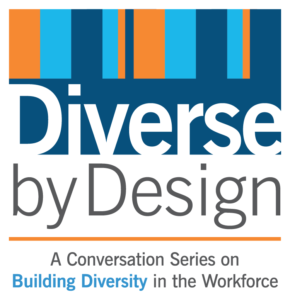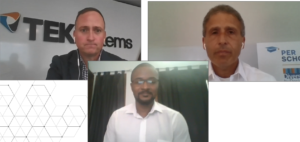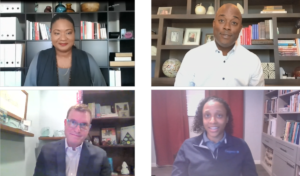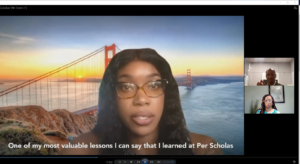Per Scholas announced as awardee in $10 million competition to improve the economic health of low-income families in the u.s.
Economic Opportunity Challenge Will Help Train Individuals to Launch Successful Careers in Technology
Chicago, IL, December 15, 2020 – Today, Lever for Change announced premier technology workforce development organization Per Scholas as the recipient of the $10 million Economic Opportunity Challenge. Per Scholas advances economic equity through rigorous, tuition-free training for careers in IT and connects skilled talent from underserved communities to leading businesses. The “Proven Pathways to Transformative Careers in Tech” project was selected from a pool of 160 applicants and five finalists.
Over the next three years, Per Scholas will use the grant to disrupt generational cycles of poverty affecting more than 13,000 individuals seeking technology careers in cities across the U.S. With this funding, Per Scholas will expand 14 of its existing in-person training locations, launch 10 new ones, and scale new remote offerings to help triple the number of people trained by 2023.
The Economic Opportunity Challenge was designed to scale a game-changing solution to improve the economic health of low-income families in the U.S.
“All of the finalists in this Challenge presented compelling ideas for expanding economic opportunities that warrant funding beyond the grants received as a result of the competition,” said Cecilia Conrad, CEO of Lever for Change. “The donors were particularly inspired by the vision of the Per Scholas team to strengthen untapped talent in our country.”
The sponsors of the Challenge, who wish to remain anonymous, are seeking additional donors to fund Per Scholas, as well as a number of other highly rated organizations that applied to the Challenge, to ensure that these outstanding projects secure the resources they need to carry out their vital work.
In this regard, Focusing Philanthropy, a multi-year philanthropic partner of Per Scholas, has committed at least $5 million of additional funding to implement Per Scholas’ winning vision articulated in the Economic Opportunity Challenge. Catalyzing the “Proven Pathways to Transformative Careers in Tech” project is Focusing Philanthropy’s second “Bold Initiative” – a transformative, large-scale multi-year partnership to support a proven effective model with an established implementation partner.
“We know proper education and focused job training address two of the root causes of poverty, and workforce development programs can be an effective intervention method,” said Larry Gilson, Chairman of Focusing Philanthropy. “Per Scholas is especially attractive because it designs training courses collaboratively with partner companies, tailored to their specific recruitment needs. This is why Per Scholas graduates have such a high hiring rate and command good wages in career track jobs.”
“COVID-19 has not only changed the way we live our lives, but also transformed the way we think about work and education,” said Plinio Ayala, President and CEO of Per Scholas. “In light of pandemic-induced layoffs, business closures, and economic hardship, it’s crucial that we help people prepare for the jobs of tomorrow. This incredible award is a down payment on a more equitable economic recovery. Generous support from the Economic Opportunity Challenge donors and Focusing Philanthropy will seed a growth fund that will enable Per Scholas to scale rapidly across the U.S.”
Lever for Change is featuring Per Scholas, and all of the other Economic Opportunity Challenge finalists below, in its Bold Solutions Network. The Network seeks to match additional donors and funding with nonprofits and social enterprises whose solutions to significant social challenges were ranked highly after rigorous evaluation in Lever for Change competitions.
- Skills for America’s Future: Changing Lives Through a Jobs-First Model: Skills for Chicagoland’s Future will drive economic mobility in 17 cities by placing 10,325 low-income individuals into meaningful employment over the next five years.
- Moving Families Out of Poverty Permanently: Family Independence Initiative (FII) will partner with the City of Chicago to move low-income families out of poverty, permanently. FII will invest directly in the existing strengths and solutions of low-income families and their communities, and remove the deficit-based criteria traditionally used to access support.
- Making Freedom Free: Bail and Economic Mobility in the South: The Bail Project will provide free bail assistance and wraparound services in six additional jurisdictions in the South and advocate for systemic changes to the pre-trial system.
- Chicago Asset-Building for Children (Chicago ABCs): Chicago ABCs, a coalition made up of the Chicago Community Trust, Heartland Alliance, Community Organizing and Family Issues, Family Independence Initiative, Chicago Department of Public Health and the Illinois State Treasurer’s Office will braid three proven strategies: child savings accounts, cash transfers, and visiting nurses in a dual generation approach to propel 4,600 families to economic security.
Applications for the Economic Opportunity Challenge were evaluated during a three-month review process by more than 120 philanthropic and civic leaders, as well as subject matter experts in economic development, public policy, youth opportunity, economic justice, and regional planning, among other issue areas. Applications were evaluated based on four criteria: magnitude of impact, strength of evidence, likelihood of success, and potential for scale.
Donors interested in funding outstanding projects identified in this Challenge or who wish to learn more about our services may contact Dana Rice, Vice President of Philanthropy at Lever for Change.
More information on the Economic Opportunity Challenge can be found at www.economicopportunitychallenge.org.
Per Scholas
Per Scholas is a national organization that has been advancing economic mobility for 25 years. Through rigorous training, professional development, and robust employer connections, we prepare individuals traditionally underrepresented in technology for high-growth careers in the industry. We partner with leading employers to build more diverse talent pools, directly connecting our graduates to new career opportunities at businesses ranging from Fortune 500 companies to innovative startups. With campuses in 14 cities, Per Scholas has trained more than 12,000 individuals in tech skills, building bridges to careers in technology.
Lever for Change
Lever for Change, a nonprofit affiliate of the John D. and Catherine T. MacArthur Foundation, helps donors to find and fund solutions to the world’s greatest challenges, ranging from racial and gender equity to economic development and climate change. Building on the success of the MacArthur Foundation’s $100 million competition, 100&Change, Lever for Change customizes and manages open and transparent competitions for donors. In addition, we match donors with nonprofits and social enterprises in our Bold Solutions Network whose solutions to significant social challenges were highly ranked after rigorous evaluation in one of our competitions. Currently, Lever for Change is managing nine competitions, ranging in size from $10-to-100 million, awarding $295 million to grant recipients and strengthening dozens of top organizations. For more information, visit www.leverforchange.org.
Focusing Philanthropy
Focusing Philanthropy is a 501(c)3 nonprofit that believes donations should be made with the same level of strategic intent, information, and confidence as other investments. The organization targets serious human challenges that individual donors can successfully address, chooses tactics that are demonstrably effective, identifies confidence-inspiring implementing partners, conducts ongoing monitoring, and assures substantive reporting. Over the past several years, Focusing Philanthropy has deployed more than $65 million with significant impact on the lives of over 4.5 million people. Its services are provided free to both donors and implementing partners in an effort to scale interventions that work. Donations are fully tax deductible, and Focusing Philanthropy covers all administrative costs and replenishes credit card transaction fees so that 100% of funds contributed go to implementing partners. For more information, visit www.focusingphilanthropy.org.
How To Make Diversity And Inclusion Successful As Part Of The War For Talent
Demand for Per Scholas Training is Up 200%. This Grant Will Help it Grow More.
The future of broadband connectivity
The Pandemic Widened The Skills Gap And The Tech Industry Must Step Up
Nonprofit Helps Close the Tech Opportunity Gap Among Women in the Bronx
Diverse by Design 2020

Since 2016, Diverse by Design brought together c-suite thought leaders to discuss best practices and solutions for businesses to attract, develop, and retain a more diverse and inclusive workforce. With the 2020 global pandemic putting a halt on all in-person gatherings, this year’s conference was reimagined as a virtual event.
This year’s event evolved into a three-part virtual conversation series hosted on October 2, 9, and 16, from 2 to 3 pm ET, pivoting away from previous years’ single-day, city-based proceedings.

Panel 1: Designing People Solutions for the New Tech Marketplace
Our first session featured Per Scholas President and CEO Plinio Ayala alongside TEKsystems President Jay Alvather for a virtual fireside chat on the important role which private/nonprofit tech training partnerships have played in driving a more equitable and resilient workforce. Per Scholas Executive Vice President of Social Ventures Damien Howard moderated the conversation.
“I say often that our partnership with Per Scholas is an unquestionable win-win,” stated Jay. “Per Scholas’ mission aligns so well with our purpose at TEKsystems which is to create the most significant opportunities for our people and to achieve personal and professional growth.”
“Our partnership illustrates how you can develop high-quality tech talent from non-traditional sources and diverse backgrounds,” replied Plinio. To date, the TEKsystems and Per Scholas partnership has trained over
In response to concerns regarding post-pandemic recovery efforts, both Jay and Plinio agreed that the pandemic has amplified reliance on technology and the need for businesses to hire qualified tech talent.
“It’s critical to provide opportunities to individuals who otherwise might get lost in our economy. This type of corporate-nonprofit partnership can strengthen the economic base for the country and build a stronger post-pandemic recovery,” stated Plinio. For Jay, the tech talent pipeline isn’t growing fast enough organically to attract more talent into the field and should pursue more creative ways to do so. “I think the key is being able to bridge not only the diverse talent gap but also make the more streamlined, direct connection to those needed employment opportunities – providing not only skills but access.”
Check out the full-length session here.
Panel 2: Designing Philanthropy and Business Strategies for Deep Impact
Our second session considered how corporations can strategically leverage philanthropic resources, thought leadership, and employee engagement to scale business impact on the future of work. Panelists discussed strategies to align corporate philanthropy with business KPIs, employee engagement aligned with community work, as well as crafting executive thought leadership to elevate core themes of sustainability, equity, and impact.
Our distinguished panelists at this session were:
- Hardmon Williams, Vice President, AT&T Believes
- Monique Baptise, VP Global Philanthropy, JPMorgan
- Tan Moorthy, Executive Vice President, Head of U.S. Delivery Operations and Global Head of Education, Training & Assessment
This session was moderated by Sacha Thompson, Founder and CEO at The Equity Equation, LLC.
“[Adaptability], that is one of the biggest attributes an employee can have,” began Hardmon Williams, Vice President, AT&T Believes. AT&T recently profiled several Per Scholas graduates for their recent announcement to support online academies, including Per Scholas. (Click here to hear from Per Scholas New York alum, Shaniece Crumpler.) “Shaniece’s notion [on adaptability] is something that we embody from those who come through our pipeline.”
For Monique Baptise, VP Global Philanthropy, JPMorgan, it’s about taking intentional steps forward towards building opportunities for people of color in which corporations tap into their expertise in order to strengthen programs and opportunities to provide mentorship to those looking to get into the IT field. “How do we help communities recover in deep ways, find new options, and think innovatively about these strategies and change outcomes?”
The “learn while you earn” model is one approach that corporations can adopt to help provide opportunities to their employees. Tan Moorthy believes that employers who offer upskilling opportunities and training can play a pivotal role in helping to resolve education inequities in communities across the country.
Check out the full-length session here.

Panel 3: Designing Pathways for the New Worker
The third session examined internal business pathways designed for the “new worker.” In this case, new worker doesn’t refer necessarily to a younger worker, but to a worker trained to succeed in today’s high-tech environment. This means that today’s workers need to develop new skills or update old ones at every step of their career in order to keep their skills relevant.
Our distinguished panelists at this session were:
- Jason Oliver, Vice President, AT&T University Operations
- Janet Pope, North America Corporate Responsibility Director, Capgemini
- Guy Fruda, Managing Director, Deloitte
This discussion was moderated by Tia Buckham-White, Notre Internationale.
The conversation in this session was around such topics as a recent Deloitte executive survey that reported more than three-quarters of respondents intend to reskill employees this year, but less than half put systems in place to reward new skill development. These two findings are somewhat in conflict and demonstrate that not only does new tech skills training need to be made available to workers, but they also need to be incentivized to take the time out to enroll in this training and develop their skills.
Jason Oliver, VP of AT&T University Operations talked about AT&T’s commitment to skills-building and tech training programs such as Per Scholas that offer greater equity of access to opportunities for individuals in diverse communities, many of whom have historically been excluded from tech careers. During this portion, we watched a short video of a Per Scholas graduate who had attended a Per Scholas training course funded by AT&T grants.
Janet Pope, Director of CSR for North America at Capgemini spoke about some of the challenges people of color and women have experienced historically to overcome barriers to entry into the tech industry. She referenced the need for companies to consider alternative tech training paths, such as Per Scholas, in order to provide greater access to tech careers. This is important because options like Per Scholas are available to all interested individuals, are free of charge (tuition is paid for by corporate sponsors and funders), and intense boot-camp style courses take 12-15 weeks to complete, which means that there is an ongoing pool of graduates. But this means that many companies have to think differently, and not just look at 4-year colleges as a source for new hires. Janet also spoke about how a company’s corporate social responsibility role can influence greater inclusion and diversity in hiring practices.
Finally, Guy Fruda, Managing Director, Deloitte, talked about the rigor and long-term focus on building diversity into hiring that is required to overcome the current low level of representation among communities of color and women in tech. He emphasized that this takes senior management commitment and the building of a culture of diversity and inclusion. He also talked about creating an infrastructure of support, such as mentoring and career development to increase retention of talent from diverse backgrounds. He talked about this as a key strategic advantage that Deloitte has built and emphasized that companies with greater diversity are documented to be stronger in terms of overall performance, productivity, and employee morale.
Check out the full-length session here.
We truly enjoyed our third session and especially appreciated the rapport between our panelists. We thank all of our participants and moderators for this informative session.

